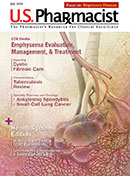A recent population-based study published in the journal CHEST found that although lung cancer screening (LCS) rates decreased in some states during the COVID-19 pandemic (2020), 19 states experienced significant improvements in screening rates despite the pandemic. Overall, lung cancer screening rates remained low and unchanged. In the study, researchers from the American Cancer Society in Atlanta assessed annualLCS rates before and during the pandemic nationally and by state. The numbers of LCS performed in 2019 and 2020 were obtained from the American College of Radiology LCS public reports, and LCS rates among eligible adults were compared before and during the pandemic.
The researchers discovered that 564,164 and 557,795 of 8.51 million eligible adults received LCS in 2019 and 2020, respectively. National LCS rates were unchanged between 2019 and 2020 (6.6% vs. 6.5%; screening rate ratio [SRR], 0.99; 95% CI, 0.97-1.01). In five states (Utah, Rhode Island, Vermont, Hawaii, and Maryland), SRRs declined significantly, by 23% to 52 % from 2019 to 2020. SRRs were unchanged in 25 states and increased significantly in 19 states—including by >20% in Nevada, West Virginia, Maine, and Kentucky—during the same period.
The authors wrote, "The lack of nationwide declines could be due to underutilization of LCS before the pandemic began when only 5% to 6% of adults received screening in 2018, 5 of which limited the room for further decreases. Rates, however, increased between 2019 and 2020 for 19 states, which suggests that health systems and local and state-level cancer control efforts played a role in improving LCS rates."
The authors continued, "States' stay-at-home orders and COVID-19 surges may have influenced short-term screening volumes, though there was not a clear pattern with annual lung cancer screening rates. During the same period, screening rates were unchanged in 25 states."
The authors concluded that although national LCS rates remained low and unchanged, 19 states experienced significant improvements despite the pandemic. Best practices from successful state and local LCS programs could inform ongoing efforts to detect lung cancers early.
The content contained in this article is for informational purposes only. The content is not intended to be a substitute for professional advice. Reliance on any information provided in this article is solely at your own risk.
« Click here to return to Lung Cancer Update.
Published September 22, 2021






